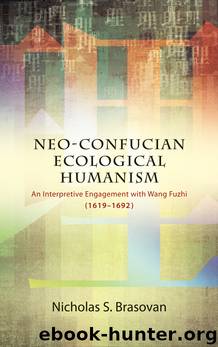Neo-Confucian Ecological Humanism by Brasovan Nicholas S.;

Author:Brasovan, Nicholas S.;
Language: eng
Format: epub
Publisher: State University of New York Press
Published: 2017-03-14T16:00:00+00:00
4
Between Nature and Persons
Ecological humanism asserts a belief that persons and nature are ontologically intertwined through recursive, interactive, causally efficacious, historical relations. In short, the concept of reciprocity serves as an overarching theoretical framework for the paradigm. Within this framework, the epistemology, metaphysics and axiology are holistically interrelated as isomorphic structures. Thus, the keystone concept of reciprocity establishes the paradigm’s systematic unity. With this in mind, we begin this chapter with an exposition of ecological humanism’s novel idea of humanizing nature, an idea of humanizing that entails the reciprocal process of naturalizing.
After foregrounding this perspective on humanizing nature, we then turn to Li Zehou’s philosophy of history and the history of Chinese philosophy: Li’s theory provides a cogent theoretical resource for advancing the thesis of neo-Confucian ecological humanism. Li’s terminology of “humanizing nature” in the context of traditional Chinese philosophy resonates with the terminology of ecological humanism; moreover, Li’s theory serves as a means for translating Wang Fuzhi’s neo-Confucian discourse into familiar and agreeable terms for ecological humanism. Thus, Li’s position provides a triangulating viewpoint from which we may further link ecological humanism to Wang Fuzhi, and thereby hermeneutically enhance and enrich a neo-Confucian model of ecological humanism.
Wang conceives of the relationships between nature and persons as manifold and complex. He does not dogmatically adopt the traditional Confucian slogan of “continuity of nature and persons”; instead, he critically adopts it in conjunction with a complementary concept of “interstice” or “between nature and persons.” With this concept Wang advances a two-pronged analytic attack against Daoism, on one side, and earlier Confucianism, on the other.
After presenting Wang’s analytical critique of “heterodoxy” and “orthodoxy,” respectively, we turn to his natural philosophical anthropology. To this end, we endeavor to uncover Wang’s adoption and development of Mencius’s account of the heart-and-mind. Finally, before concluding the present chapter, the discussion turns to the deep Confucian tradition of ritual propriety as a particular process of humanizing nature in the context of neo-Confucian ecological humanism.
Download
This site does not store any files on its server. We only index and link to content provided by other sites. Please contact the content providers to delete copyright contents if any and email us, we'll remove relevant links or contents immediately.
| Anthropology | Archaeology |
| Philosophy | Politics & Government |
| Social Sciences | Sociology |
| Women's Studies |
The remains of the day by Kazuo Ishiguro(8407)
Tools of Titans by Timothy Ferriss(7824)
Giovanni's Room by James Baldwin(6818)
The Black Swan by Nassim Nicholas Taleb(6775)
Inner Engineering: A Yogi's Guide to Joy by Sadhguru(6446)
The Way of Zen by Alan W. Watts(6292)
Asking the Right Questions: A Guide to Critical Thinking by M. Neil Browne & Stuart M. Keeley(5360)
The Power of Now: A Guide to Spiritual Enlightenment by Eckhart Tolle(5345)
The Six Wives Of Henry VIII (WOMEN IN HISTORY) by Fraser Antonia(5241)
Astrophysics for People in a Hurry by Neil DeGrasse Tyson(5004)
12 Rules for Life by Jordan B. Peterson(4166)
Housekeeping by Marilynne Robinson(4070)
The Ethical Slut by Janet W. Hardy(4042)
Skin in the Game by Nassim Nicholas Taleb(3973)
Double Down (Diary of a Wimpy Kid Book 11) by Jeff Kinney(3935)
Ikigai by Héctor García & Francesc Miralles(3900)
The Art of Happiness by The Dalai Lama(3851)
Skin in the Game: Hidden Asymmetries in Daily Life by Nassim Nicholas Taleb(3731)
Walking by Henry David Thoreau(3685)
